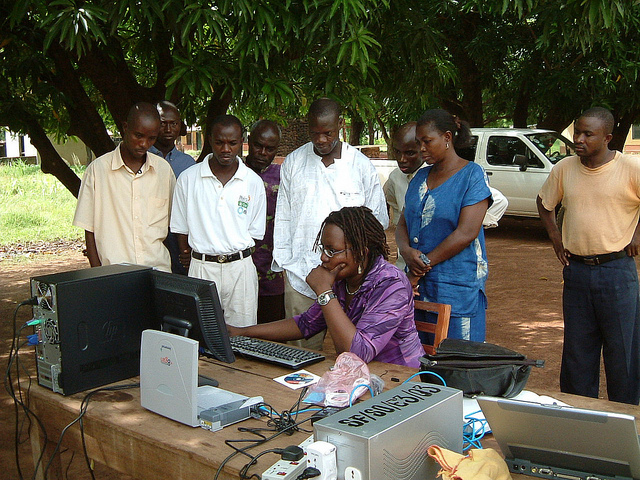On her visit to Nigeria in September, IBM President and CEO Virginia “Ginni” Rometty announced that IBM would establish an innovation center in Nigeria in the first quarter of 2014 and fund major ICT research projects, complementing the efforts of the Ministry of Communication Technology’s iDEA incubation centers and other ICT entrepreneurs to make Nigeria an ICT hub for software innovation.
IBM Innovation Centers, which help IBM clients and business partners learn about new technologies and get hands-on assistance for creating solutions to business problems, are already operating in South Africa, Morocco and Kenya, as well as in countries outside Africa. In Africa, however, the program is being expanded to address the needs of startups.
IBM’s seemingly endless drumbeat of activity in Africa blurs the lines between bottom-line business and corporate social responsibility (CSR). Indeed, theirs is a lesson in how to ensure your company’s sustainability by acting responsibly in the markets where you operate.
IBM’s Corporate Service Corps, which is modeled on the Peace Corps, has sent nearly 60 teams of IBM volunteers to Africa in the last five years. To date, these teams have helped communities in Ghana, Nigeria, Senegal, South Africa, Tanzania, Kenya, Egypt and Morocco address fundamental problems.
The teams spend three months preparing for their engagements, and two to four weeks on the ground, gathering information and writing proposals that address everything from economic development strategy and skills development to transformation of government agencies and businesses.
In Thies, Senegal, a 14-member team presented city leaders with a proposal for growing the economy through bolstering entrepreneurship, agricultural exports and education. The IBMers designed an entrepreneurial training program for women and young adults. They also proposed a mobile phone texting application that allows entrepreneurs to better track orders, sales and inventories.
Africa is a nascent market for IBM, but it is one with immense potential. While the company’s global year-on-year revenue dipped 2.3 percent, to $104.5 billion, in 2012, IBM executives took note of the “good performance in Africa,” where sales were about $400 million and are forecast to surpass $1 billion in 2015. According to Bloomberg Businessweek, that’s faster growth than IBM saw in India, where it started a push in 1992 and only surpassed $1 billion in revenue in 2007.
IBM is prodding this growth along in ways that would benefit both the company’s bottom line and the continent’s development in terms of technological capacity, talent and R&D capabilities. Indeed, Bloomberg reports that the company is seeking to expand in more profitable areas like software and services to make up for the deterioration of its older hardware business.
“I have actually selected Africa, and Nigeria especially, to make our focal point for growth in the next decade and we have invested both in people, skills and some of our most precious resources, such as innovation and research centers, to be on this continent,” Rometty is quoted as saying in Nigeria.
In 2012 IBM established its first science and technology research lab in Africa. Housed on the campus of Catholic University of Eastern Africa in Nairobi, Kenya, IBM Research-Africa initially is focusing on e-government, using technology to improve traffic and water systems, and designing programs to build up science and technology skills.
That focus is in line with priorities identified by government, university, business and civic leaders. The lab’s Resident Scientist program invites African graduate students to work at the lab and collaborate with IBM researchers.
In South Africa, IBM collaborates with Dutch space agency ASTRON and the South African National Research Foundation on research aimed at creating an information technology system for managing the Square Kilometre Array (SKA) project. Slated for completion in 2024, SKA is a joint effort of 10 countries aimed at building the largest-ever radio telescope, comprising more than half a million antennas scattered across southern Africa and Australia.
The project is becoming the nexus of its own innovation ecosystem, with hundreds of engineers, scientists and students already working on different aspects and dozens of companies waiting in the wings as designs are completed and construction begins.
There’s a skills gap in Africa and IBM is developing relationships with local universities to help fill it. A 2012 partnership with Stellenbosch University in South Africa provides equipment, software and training for post-graduate computer science students.
Relations with three leading universities in Kenya — Strathmore, Riara University, and Jomo Kenyatta University of Agriculture and Technology — focus on such hot-button technologies as mobile communications, big data analytics and cyber security.
Beginning in Mauritius and set to expand in 10 more countries, the IBM Technical Institute program helps academia, IT specialists and IBM clients identify technology solutions to problems facing businesses and the public sector in Africa. IBM provides the technology and trainers.
IBM is also involved in the Leadership Education and Development (LEAD) program that brings together MBA students from Africa with faculty and students from leading U.S. universities and IBM executive trainers.
In April, IBM and Bharti Airtel, the Indian mobile communications carrier for which IBM provides services in more than a dozen African countries, established a Mobile Center of Excellence at the University of Ghana. The goal is to provide technology and skills training to help students develop new products and services and, potentially, to launch startups to take their innovations to market.
Airtel and IBM plan to establish additional centers of excellence in Africa, starting with Nigeria and Kenya.
Through its Global Entrepreneur Program, IBM brings together entrepreneurs, venture capitalists and tech hubs in mentorship relationships. The centerpiece of the program is the IBM SmartCamps, aimed at identifying early stage entrepreneurs who are developing business ventures that align with the company’s Smarter Planet vision initiative.
In July, Kenyan startup Weza Tele, of MyOrder Enterprise, won the SmartCamp competition at the 2013 Tech4Africa conference for its SMS ordering service, giving it the chance to attend the October SmartCamp in Johannesburg, South Africa, and the regional competition for IBM’s Global Entrepreneur Program in Brazil.













